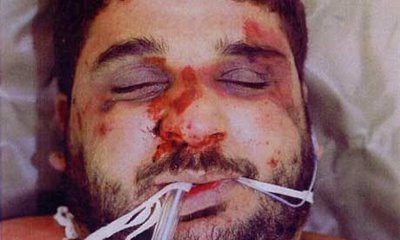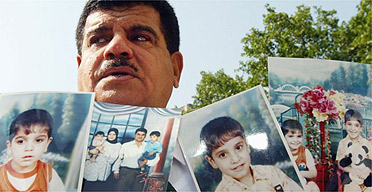A form of justice at last for Baha Mousa.
It's wonderful news that the family of Baha Mousa and 9 other innocent Iraqis who were viciously beaten and tortured by British soldiers are to be paid almost £3m in compensation.
More interesting though is how this news is going to be communicated to readers and others by certain media organisations that did their best to either ignore our personal Abu Ghraib shame or to play it down. As you might have known, the biggest, most unquestioning supporter of "Our Boys" was at the forefront of it. After all but one of the soldiers court martialled was cleared, a result of what the judge described as a complete closing of ranks, with the words "I don't remember" being used over 600 times by the various witnesses according to one of the lawyers involved, the Sun published this following leader comment:
COMMON sense prevailed when two British soldiers were cleared of abusing Iraqi prisoners.
Major Michael Peebles and Warrant Officer Mark Davies served with courage and bravery in the most difficult conditions.
This ludicrous show trial — which has already seen four other soldiers cleared on the judge’s orders — has been a waste of time and money.
These men risked their lives in Iraq but were repaid by being hung out to dry.
Every aspect of investigating so-called crimes within the military needs to be re-examined. Our servicemen and women deserve nothing less.
These "so-called crimes" have now been recognised by the Ministry of the Defence, but only after being forced into holding an independent inquiry by lawyers acting for the Iraqi men. The MoD, in the form of Colonel David Black, was also dismissive after the court-martial collapsed in such ignominy:
[Our Boys needed to be able to work] “without looking over their shoulders inhibited by the fear of such actions by over-zealous and remote officialdom”.
Such over-zealous and remote officialdom has now apologised "for the appalling treatment that you suffered at the hands of the British army. The appalling behaviour of British soldiers made us feel disgusted." Not so those within the army and the media however that did everything they possibly could to pretend that that such appalling treatment had either never taken place or had been the work of one lone soldier who bravely owned up to his part in beating Baha Mousa and two of the other men detained with him. Donald Payne's punishment for his role amounted to a year in prison, a discharge from the army, and the loss of his pension. No one else is now likely to charged or prosecuted in connection with the incident.
Comparisons will doubtless be drawn with the compensation payouts to those who have lost limbs and suffered other injuries while in service in both Iraq and Afghanistan, often derisory settlements which are an insult to their commitment and sacrifice, but they do know what the consequences of their decisions are when they join up. Baha Mousa and the other men were simply in the wrong place in the wrong time, and mistreated by soldiers that had not been trained properly and whom were under the impression that such techniques had been authorised. Whether they were or not is still open to question, but the payments to the men will help to close the chapter on what went wrong. The independent inquiry, which will hopefully get to the very bottom of what did, although putting too much faith in it would be unwise, should provide the lesson on how this is to be avoided in the future. Perhaps the real blame should however lie with the politicians that signed us up to the illegal, murderous folly of the war in the first place.
Labels: Baha Mousa, British army abuse, compensation, Iraq, Iraq disaster, Ministry of Defence, Scum-watch, Sun-watch




